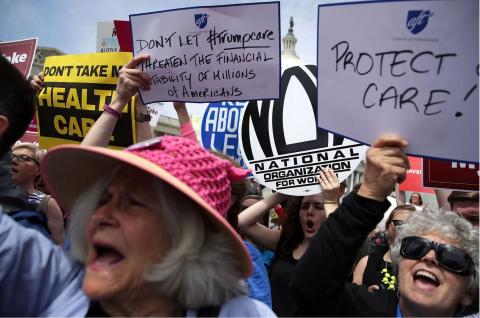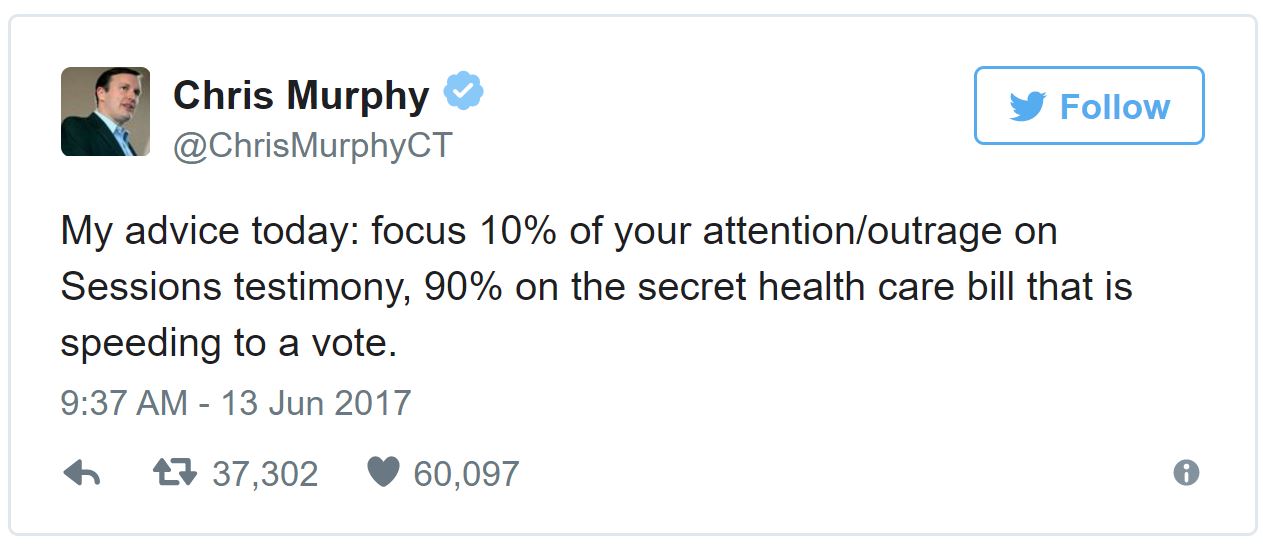Progressive activists and Senate Democrats are trying to mount an all-out campaign to sink a Republican health care bill that Senate Majority Leader Mitch McConnell wants to pass before Congress’s July 4 recess.
“We’re in the red zone,” Sen. Patty Murray (D-WA) said in an interview on Monday night. “People need to get out there and make their voices heard. We are telling everyone we can: ‘Now is the time call your senator, to do everything you can to make sure senators who vote for this know they will be held accountable.’”
There’s just one key problem with this effort: Nobody on the left knows exactly what they’re fighting against, because Senate Republicans haven’t yet released their bill. Axios reported on Monday that McConnell has no plans to release legislative text, and raised the possibility that the bill may not get a score from the Congressional Budget Office until after it passes the upper chamber.
“This is not appearing on the front pages of newspapers, and that is by design,” Ben Wikler, Washington director of MoveOn.org, told 10,000 listeners on the organization’s monthly “Ready to Resist” conference call Sunday night. “This is a five-alarm fire. The rumor is that the Republican plan is to not show the final version of it until it’s finally passed. This is red alert.”
Progressive groups on the Hill were scarred this May by the suddenness and speed with which House Speaker Paul Ryan successfully rammed through the House health care vote after a previous aborted attempt suggested the bill was dead, with some admitting to getting caught “flat-footed.” As McConnell looks likely to try another legislative lightning strike in the Senate, the left is trying to fortify their opposition — this time, before it’s too late.
Inside the left-wing blitz to mobilize against AHCA
On Monday, the anti-Trump group Indivisible launched a new campaign called “Trumpcare 10.” They’re highlighting the 10 states — and 11 Republican senators — that the group believes are most likely to break with their party to defeat the health bill. (They are: Alaska's Lisa Murkowski and Dan Sullivan, West Virginia's Shelley Moore Capito, Maine's Susan Collins, Nevada's Dean Heller, Arizona's Jeff Flake, Colorado's Cory Gardner, Ohio's Rob Portman, Pennsylvania's Pat Toomey, Louisiana's Bill Cassidy, and Arkansas's Tom Cotton.)
“If we can just get three of them to break, then we win,” said Ezra Levin, founder of the anti-Trump group Indivisible, in an interview.
Indivisible has about 5,800 local chapters across the country, and they are now working to pressure Republican senators supporting the new bill. In Louisiana, activists plan to hold six simultaneous protests next week at all of the district offices of Cassidy, a doctor who has expressed uneasiness with Republicans’ proposed Medicaid cuts.
“This may be the last push we need,” said Lara Crigger, 34, founder of an Indivisible chapter in Metairie, Louisiana, about her group’s plans to get hundreds of people to show up at Cassidy’s offices next Thursday. “It’s do or die. Literally. This is a life-or-death situation in the most literal sense.”
Since the beginning of Trump’s administration, no issue has proven more central to the “resistance” protest movement than health care. Though the exact details haven’t been hammered out, Republicans are now marching forward with a bill that’s expected to end the Medicaid expansion, make the exchange subsidies far less generous for the poor and elderly, and possibly allow health insurance plans to charge higher premiums to people with preexisting conditions.
Indivisible’s protests are just one of the many tools the left plans to throw at moderate Republican senators in the coming weeks in response. MoveOn.org is urging its members to set daily reminders on their phones to call at least one Republican Senate office every day. A new app, launched by the Progressive Coders Network, allows constituents to download all the contact information for the staff of their local representatives.
Planned Parenthood expects to hold at least 100 rallies, protests, and phone banking events over health care over the next two weeks, a spokesperson said. Members of UltraViolet, a progressive group formed in part to fight sexism, have sit-ins planned for nine separate Senate GOP offices this Friday at 2pm, said Nita Chaudhary, UltraViolet’s co-founder.
“Across the country, it’ll be hundreds of people,” Chaudhary said. “They are going to occupy those Senate offices until they get answers.”
Sen. Murray said she and her fellow Senate Democrats would use their platforms to urge constituents across the country to call and write to Republicans supporting the bill. The progressive advocacy group CREDO has already placed 6,100 calls in a campaign targeting four of the Republican senators with the biggest reputations as moderates — Collins, Flake, Murkowski, and Heller.
Normally, protest groups try to direct the thrust of their efforts to hitting offices in Washington, DC. CREDO is instead hitting senators in their district offices. Their plans are to escalate their call volume to at least 1,000 calls to each of those four senators’ offices in the home stretch of McConnell’s push around the health care bill.
“Staffers in Arizona and Maine and Alaska not used to getting hundreds of calls a day from angry constituents,” Murshed Zaheed, political director of CREDO, told me. “We just want this to become unrelenting and daily. We want these staffers to feel as if they’re under siege from the rest of America, from a country that hates this bill.”
Left-wing groups are determined not to get caught “flat-footed” this time
Left-wing groups believe that a campaign can help derail Republicans’ push to repeal Obamacare in part because they think they’ve already seen what a successful campaign looks like. In March, Speaker Ryan’s first attempt to pass the American Health Care Act failed amid an onslaught of protests, negative media attention, and the relentless jamming of congressional phone lines.
"It was the town halls, and the stories, that convinced me that people might actually stop this bill," Tom Perriello, a former Democratic Congress member now running for governor of Virginia, told the Washington Post’s David Weigel.
But after the first attempt to pass the bill failed on the floor, the outcry in the media and liberal groups dissipated with it. House Republicans quietly regrouped, tweaked the bill, and rammed it through the House before the CBO could score it. The media attention and mobilized resistance over the second vote was far diminished from the crescendo that preceded the first doomed effort.
Senate Democrats and other progressive groups are trying to avoid falling into the same trap twice. “Republicans believe they lulled everyone into focusing elsewhere and are meanwhile writing a bill,” Sen. Murray told me.
But the left may already be getting outmaneuvered. Wikler, of MoveOn.org, said Sunday the number of phone calls being placed to Senate offices had dwindled to where they were before Trump’s election. Before the first health care vote failed, some members of the House reported receiving hundreds of calls every day; that number fell to closer to a few dozen a week.
“That is unacceptable,” he told the activists on Sunday, citing the need to dramatically ramp up the number of calls being placed to derail Obamacare repeal. “We need to go back to how it was at the beginning of the resistance.”
The other critical question is media coverage. During the weeks leading to the first failed House vote, cable TV news mentioned the phrase “health care bill” more than 600 times per day, according to statistics from IQ Media. That number again spiked above 600 around the time of the successful second House vote — but only, crucially, on the same day House Republicans passed their bill, May 4. Right now the phrase “health care bill” is only being mentioned on cable news a few dozen times a day.
Sen. Murray also pointed to the blitz against Trump Education Secretary Betsy DeVos when her nomination was being debated as proof of the left’s ability to derail the Republican agenda. (DeVos was still confirmed, with Vice President Mike Pence casting the tie-breaking vote.)
“When the Senate phone system was shut down over DeVos, it made several senators have to think about their votes. ... They thought they’d fly it through without a hearing, and we made it miserable for them,” Murray said. “These are their constituents. And that can make a difference.”
How Senate Democrats are ready to mobilize against the AHCA
Senate Democrats say they’ll also be unified in beating the drum against Republicans’ health care bill. But for now, Senate Democrats are resisting using their “nuclear” trigger of withholding consent to shut down Senate procedure on unrelated fights.
Unlike the House of Representatives, the Senate operates under what are called “unanimous consent” agreements. If Senate Democrats withhold their consent, the routine functioning of the body — from committee hearings to routine floor votes — could grind to an immediate halt.
Staffers in seven Senate Democratic offices on Monday said that nobody expects the party to go down this path. In our interview, Murray said she didn’t believe shutting down the Senate would effectively delay McConnell, since he can call a vote on the bill at his discretion.
“If I thought that would accomplish a goal — it won’t accomplish anything under their rule, because they can bring it up no matter what,” she told me. “I do believe we fight back with everything we have.”
Others have also suggested doing so would be counterproductive. “If Democrats tried to bring the Senate to a halt — boycotting Sen. Murkowski’s Energy Committee hearing or Sen. Collins’s Aging Committee hearing, for example — that would harden Republicans’ resolve, and they’ll be that much closer to passing Trumpcare anyway,” one Senate Democratic aide said.
The groups on the activist left have a different view. MoveOn, CREDO, and Indivisible are all urging Senate Democrats to buy as much time as possible to allow them to mobilize resistance to the Republican bill. They argue that Democrats need to provoke as much theater of opposition as possible, and that withholding consent may force a delay. In an interview on Tuesday, Sen. Jeff Merkley (D-OR) expressed his openness to the idea, citing the need to “dramatize” the Republican health bill’s impact on America.
“We’re asking Democrats to withhold consent — if [Senate Minority Leader Chuck] Schumer doesn’t do it, we hope one of the other Democrats will,” said Levin, of Indivisible. “Indivisible groups in blue states will be telling their senators to do everything they can to stop Senate business on a bill that reworks a sixth of the American economy and takes health care from millions of people.”
He added: “This is the obvious strategic choice: If your goal is to sink this bill, you want as much sunlight on this as possible. Anything that allows McConnell to swiftly get this through the Senate is a win for him. Democrats have some unilateral ability to slow down this process — and they should use that power as much as possible.”
Jeff Stein report on politics & policy for Vox. He is founder & former editor of the Ithaca Voice. Twitter: @JStein_Vox



Spread the word